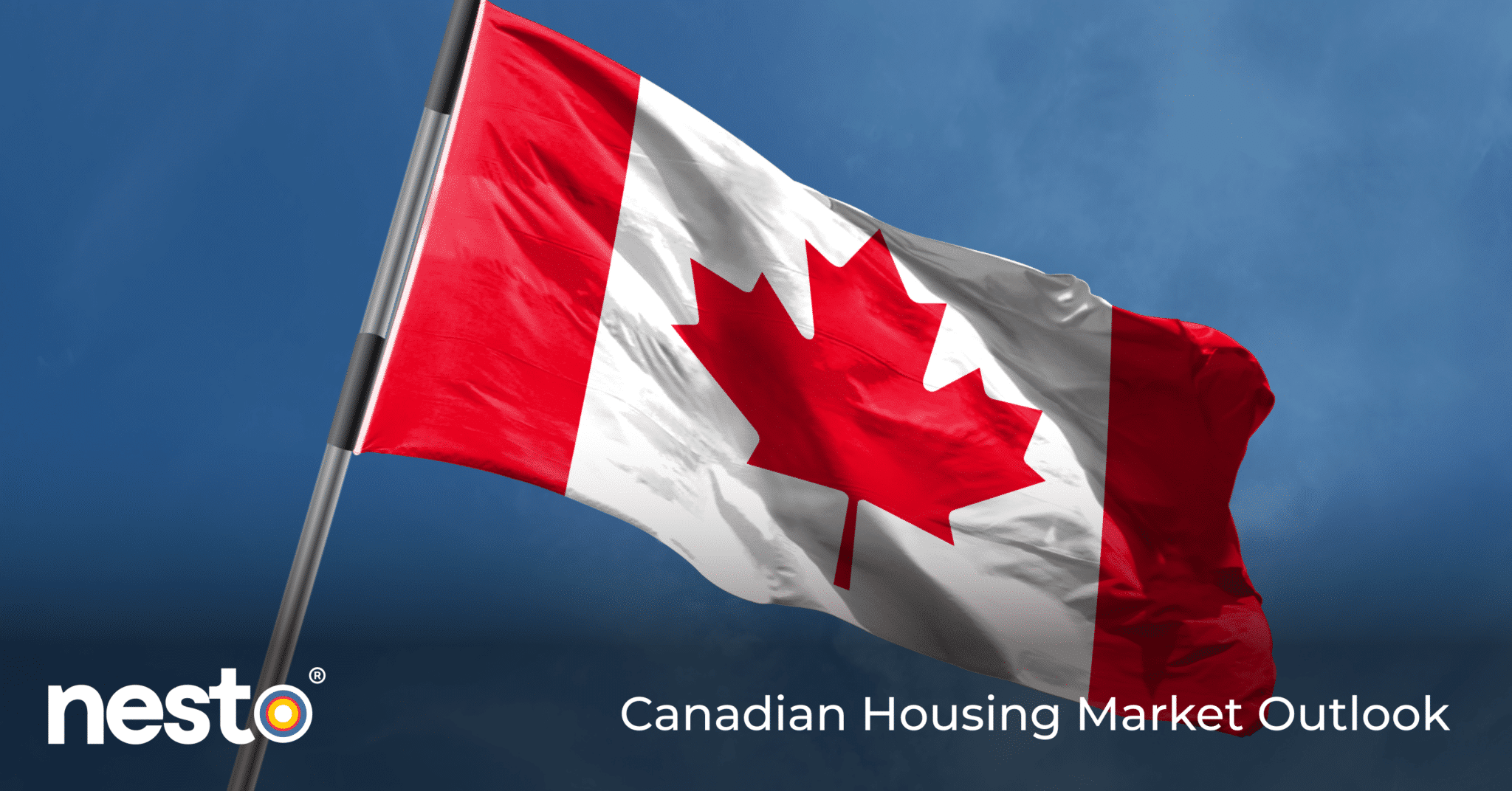Canadian Housing Market Outlook 2025

Table of contents
National Market Report Summary
- The average selling price of a home in Canada decreased by 3.7% year-over-year to $698,000 in June 2025.
- The average selling price of a single-family home in Canada decreased by 3.4% year-over-year to $776,400 in June 2025.
- The average selling price of a townhouse/multiplex in Canada decreased by 4.7% year-over-year to $637,200 in June 2025.
- The average selling price of a condo in Canada decreased by 5.2% year-over-year to $494,600 in June 2025.
- The average rent in Canada decreased by 1.6% year-over-year to $2,111 for June 2025.
- July 18, 2025: Today’s lowest mortgage rate in Canada is
for a 5-year fixed.
Composite Home Prices
![]()
The average selling price of a home in Canada was $698,000 for the month of June 2025, that’s decreased by 0.5% compared to the previous month. On a year-over-year basis, Canadian home prices have decreased 3.7% over the last 12 months.
Single-family Home Prices
![]()
The average selling price of a single-family home in Canada was $776,400 for the month of June 2025, that’s decreased by 0.4% compared to the previous month. On a year-over-year basis, single-family home prices in Canada have decreased by 3.4% over the last 12 months.
Townhouse and Multiplex Prices
![]()
The average selling price of a townhouse in Canada was $637,200 for the month of June 2025, that’s decreased by 0.9% compared to the previous month. On a year-over-year basis, the price of a townhouse in Canada has decreased by 4.7% over the last 12 months.
Condo Prices
![]()
The average selling price of a condo in Canada was $494,600 for the month of June 2025, that’s decreased by 1.1% compared to the previous month. On a year-over-year basis, the price of a condo in Canada has decreased 5.2% over the last 12 months.
We’re curious…
Canada Housing Market Summary
Data from the Canadian Real Estate Association (CREA) indicates that the benchmark price of resale residential homes sold across Canada in June 2025 was $698,000, and it decreased by 3.7% compared to a year ago.
CREA also reported a sales-to-new-listings ratio (SNLR) of 50%, indicating a Balanced nationally for June 2025.
Canadian Home Prices Stabilize as Sales Rebound in Key Regions
According to the Canadian Real Estate Association (CREA) for June 2025, national home sales rose 2.8% month-over-month, extending the recovery seen in May. While the pace of sales remains modest compared to historical levels, activity has begun to pick up, especially in the Greater Toronto Area, which has led national momentum with a 17.3% sales jump since April.
- National average home price in June: $691,643, down 1.3% from June 2024
- MLS Home Price Index: down 0.2% month-over-month, and 3.7% year-over-year
- Sales-to-new listings ratio rose to 50.1%, suggesting a return to balanced market conditions
- Active listings up 11.4% year-over-year but only 1% below the long-term average
- Months of inventory dipped to 4.7, slightly below the five-month norm
Despite stronger home sales, new listings fell 2.9% in June, tightening supply conditions. CREA and RBC both point to signs that the national housing rebound, delayed by economic uncertainty earlier this year, is beginning to emerge, with a more robust fall market in sight, barring further external shocks, such as ongoing US tariff threats.
Key Highlights Across the Country
- Ontario & BC: Market weakness persists, with home prices declining across Toronto, Niagara, Guelph, and Vancouver. Inventory remains high, and affordability pressures are acute.
- Quebec & Atlantic Canada: Home prices continue to climb. Quebec City led the nation with a 13.5% year-over-year increase, while Montreal, Saint John, Fredericton, and Halifax also posted gains.
- Prairies: Regina, Saskatoon, and Winnipeg remain strong, all reporting annual price increases of 7% or more.
- Alberta: Calgary and Edmonton saw sales level off, but still sit at healthy levels, with prices showing some softness due to growing inventory.
Home Price Trends
Nationally, home prices are flat. The MLS HPI declined just 0.2% from May, following sharper drops earlier in 2025. That has brought temporary affordability relief, especially for homebuyers priced out during the pandemic surge.
CREA cautions that year-over-year comparisons may begin to look more favourable in the coming months due to the price correction that began in late 2024.
Market Demand and Inventory Levels
The tightening in the sales-to-new listings ratio (SNLR) and declining months of inventory indicate that demand is once again outpacing new supply, particularly in cities such as Montreal, Quebec City, and Regina. Meanwhile, buyers in Ontario and BC are still navigating high borrowing costs and oversupplied conditions.
Impact on Canadian Mortgages and Bank of Canada Outlook
The June housing rebound, combined with modest price declines, offers mixed signals for the Bank of Canada. For homebuyers, current conditions may offer better affordability in slower markets like Ontario and BC, but rising confidence in other regions could shrink opportunities quickly. Renewers continue to face high rates, but relief for fixed rates may be on the way as bond yields decline. Refinancers in strong markets may benefit from higher appraisals and greater access to equity, while those in softening markets could face stricter lending conditions.
The next Bank of Canada rate decision will likely reflect these regional disparities. Still, the national trend of stabilizing prices and improving sales supports the case for holding interest rates steady in the near term.
Month-over-Month Expectations for the Canadian Housing Market
Transactions – Number of Sales
![]()
The number of sales in Canada was 38,684 during June 2025, that’s increased by 2.8% compared to the previous month. On a year-over-year basis, sales in Canada have decreased by 0.5% over the last 12 months.
New Listings
![]()
The number of new listings in Canada was 76,690 during June 2025, that’s decreased by 2.9% compared to the previous month. On a year-over-year basis, new listings in Canada have increased by 3.8% over the last 12 months.
Real Estate Market
![]()
The sales-to-new-listings ratio (SNLR) in Canada was 50% during June 2025, indicating a Balanced. On a monthly basis, that’s increased by 5.9% compared to the previous month. Canada’s yearly sales to new listings ratio has decreased by 4.2% over the last 12 months.
The sales-to-new-listings ratio (SNLR) measures the number of home sales compared to new listings. An SNLR under 40% suggests a buyer’s market in which buyers have the upper hand and more negotiating power. An SNLR between 40% and 60% is a balanced market, while an SNLR of over 60% is considered a seller’s market.
Red hot rates impacting your housing market experience?
With nesto, you can get a low rate with a 150-day hold.
Annual Changes Composite Home Prices by Province
Annual Changes to the National Composite Home Prices
We’re curious…
Rents Ease Across Canada but Remain Elevated Over Time
According to the recent data from the National Rental Report, the average asking rent across Canada fell 2.7% year-over-year to $2,125 in June, continuing a nine-month trend of annual declines. Despite this recent softening, rents remain 12% higher than they were three years ago, with most of the growth driven by the purpose-built rental market and significant gains posted between 2022 and 2024.
National and Property Type Trends
- National average asking rent: $2,125 in June 2025
- Year-over-year change: -2.7%
- Three-year change: +11.9%
- Purpose-built rents: +24.6% in three years, despite a 1.1% YoY dip
- Secondary condo market: -4.9% YoY, only +1.6% over three years
- Houses/townhomes: -6.6% YoY, -0.2% over three years
Studios have outperformed all other unit types, with rents rising nearly 20% over the last three years. One- and two-bedroom units posted sharper annual declines (-3.5%), while three-bedroom units remained more resilient, up 4.4% YoY in purpose-built rentals.
Provincial and Municipal Comparisons
Across the provinces, the steepest annual rent declines were recorded in British Columbia and Alberta, both down 3.1%, followed closely by Ontario with a 2.3% drop. Over three years, however, Alberta and Saskatchewan led the country with the most significant increases in apartment rents, up 32.8% and 36.2%, respectively. Notably, Saskatchewan was the only province to post positive year-over-year rent growth in June at 4.2%, while still offering the lowest average rent in Canada at $1,396.
Among major cities, Calgary experienced the most significant annual decline in apartment rents at 7.9%, followed by Vancouver at 7.0%, Toronto at 4.7%, and Montreal at 2.3%. On the other hand, rent growth was strongest for specific unit types, including three-bedroom apartments in Vancouver, which increased by 13.9%, two-bedroom units in Ottawa with a 3.7% rise, and three-bedroom rentals in Montreal, up 3.2% compared to the previous year.
Notably, North Vancouver and Richmond Hill remain the most expensive cities to rent in Canada, while Lloydminster, Regina, and Winnipeg top the list of the most affordable rental markets in the country.
Shared Accommodation and Government Influence
Average asking rents for shared accommodations dropped 5.1% YoY to $939 in June, driven by steep declines in Vancouver (-11.6%) and Calgary (-6.6%). However, Ottawa bucked the trend, with shared accommodation rents increasing 12.8% to a record high of $1,058.
CMHC reports that caps on temporary residents and international students are also softening demand, particularly in major cities with a high concentration of students. New builds are contributing to the available supply, further downward pressure on rents in markets such as Toronto, Vancouver, and Halifax.
Falling Rents Could Tip the Scale on Mortgage Decisions and BoC Rate Strategy
With average asking rents falling across many cities, particularly in provinces hit hardest by affordability issues, pressure may ease slightly on prospective homebuyers choosing between renting and owning. However, continued high rent levels in many parts of the country, paired with declining mortgage rates, could make buying more appealing, especially in Prairie and Atlantic markets. Renewers may see lower rental costs as a reason to consider temporary renting if they can’t afford today’s mortgage rates. Refinancers, especially those owning rental properties, should consider that declining rents in some areas could impact rental income and cash flow. For the Bank of Canada, lower rental inflation may support their decision to hold or cut rates further, reinforcing easing conditions in both the ownership and rental housing sectors.
Red hot rates impacting your housing market experience?
With nesto, you can get a low rate with a 150-day hold.
Canada Market Rents Summary
The average rent in Canada was $2,111 for the month of June 2025, which decreased by 1.6% on a year-over-year basis.
The average rent for a bachelor apartment in Canada was $1,623 for the month of June 2025, which decreased by 0.1% on a year-over-year basis.
The average rent for a 1-bedroom apartment in Canada was $1,890 for the month of June 2025, which decreased by 3.1% on a year-over-year basis.
The average rent for a 2-bedroom apartment in Canada was $2,294 for the month of June 2025, which decreased by 2.7% on a year-over-year basis.
The average rent for a 3-bedroom apartment in Canada was $1,890 for the month of June 2025, which decreased by 2.7% on a year-over-year basis.
How Does Renting Compare with Homeownership in Today’s Housing Market?
Each $100,000 in mortgage balance costs an average of $522.77 per month on nesto’s lowest fixed 5-year rate at
Rental Price Changes by City
Rental Price Changes by Province
Rental Price Growth by Housing Type
We’re curious…
Frequently Asked Questions on Canadian Housing Market Outlook for 2025
Will 2025 be a good year to buy a house in Canada?
2025 could be an ideal year for homebuyers as housing prices in Canada are expected to stabilize, offering a window of opportunity for those looking to enter the market. With demand expected to remain strong in big cities like Toronto, Vancouver, and Montreal, buyers should act quickly in regions where prices are more affordable. The potential for increased housing inventory and fewer price surges will make homeownership more attainable for financially prepared buyers.
Are Canadian home prices expected to drop in 2025?
Home prices in Canada are expected to stabilize rather than decline sharply in 2025. While some regions may experience slight price corrections, factors like low housing supply, population growth, and continued demand will keep prices relatively steady. Major urban centres may see modest increases, while smaller markets could experience greater affordability. Monitoring housing trends will help buyers identify areas with more favourable pricing.
Will Canada’s housing market still be in a bubble in 2025?
Speculation about a housing bubble remains, but experts predict Canada’s real estate market is entering a period of stabilization rather than collapse. Housing shortages, particularly in high-demand regions like Toronto and Vancouver, continue to prevent significant price drops. While affordability challenges persist, Canada’s market is more likely to experience a soft landing, with home prices balancing as supply improves.
What are the predictions for Canada’s housing prices in 2025?
Home prices in Canada are predicted to remain stable, with slight increases in major markets. Supply-demand imbalances will likely drive growth, particularly in regions with limited housing inventory. Cities like Vancouver, Montreal, and Toronto will remain competitive due to ongoing demand, while smaller markets may offer better affordability for buyers. Monitoring regional price forecasts will help identify areas with stable or lower home prices.
How will population growth impact Canada’s housing prices in 2025?
Canada’s strong population growth will continue to put upward pressure on home prices in 2025. Increased demand for homes, particularly in urban centres, will outpace the growth in housing supply, maintaining competitive prices. Efforts to improve construction and address supply shortages may help balance the market over time, but high-demand areas are expected to see continued price resilience.
Will housing affordability improve in 2025?
Housing affordability in Canada will remain a key challenge in 2025, especially in cities like Toronto and Vancouver, where demand far exceeds supply. While home prices are stabilizing, affordability improvements will depend on increased housing inventory and more balanced market conditions. Buyers looking for affordable options should explore smaller markets or up-and-coming regions where prices remain more accessible.
Why Choose nesto
At nesto, our commission-free mortgage experts, certified in multiple provinces, provide exceptional advice and service that exceeds industry standards. Our mortgage experts are non-commissioned, salaried employees who provide impartial guidance on mortgage options tailored to your needs and are evaluated based on client satisfaction and advice quality. nesto aims to transform the mortgage industry by providing honest advice and competitive rates using a 100% fully digital, transparent, seamless process.
nesto is on a mission to offer a positive, empowering and transparent property financing experience – simplified from start to finish.
Contact our licensed and knowledgeable mortgage experts to find your best mortgage rate in Canada.
Ready to get started?
In just a few clicks, you can see our current rates. Then apply for your mortgage online in minutes!















